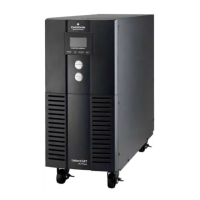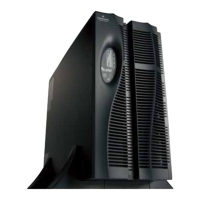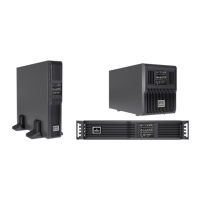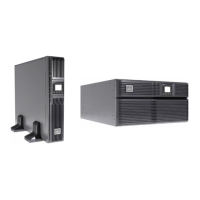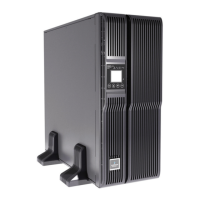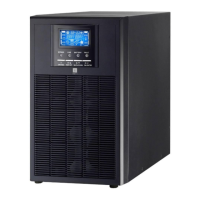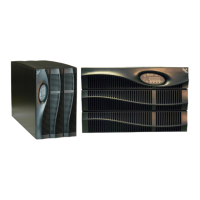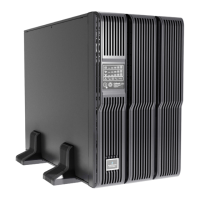Troubleshooting
49 Liebert
®
GXT4
™
7.1.2 Audible Alarm
An audible alarm will sound in conjunction with the visual indicators to indicate a change in UPS
operating status. The audible alarm will sound as described in Table 12.
7.2 Troubleshooting
In the event of an issue with the UPS, refer to Table 13 to determine the cause and solution. If the
fault persists, contact Emerson
®
Channel Support.
When reporting a UPS issue to Emerson, include the UPS model and serial number. These are
located in several places for your ease of location: on the top panel (rack mount orientation); the left
side (tower orientation); the rear panel; on the front of the unit behind the front plastic bezel; and on
the LCD select Main Menu > About.
Table 12 Audible alarm description
Condition Alarm
Battery discharge Half-second beep every 10 seconds
Low battery Two half-second beeps every 5 seconds
UPS fault, load on bypass 1-second beep every 4 seconds
UPS fault, no power to load Continuous
Overload Half-second beep every half second
Battery replacement 2-second beep every 2 minutes
Battery loss Continuous
Wiring problem (loss of proper grounding for UPS) Continuous
Bypass reminder 1-second beep every 60 seconds
Table 13 Troubleshooting table
Problem Cause Solution
UPS fails to start
UPS is short-circuited or
overloaded
Ensure UPS is Off. Disconnect all loads and ensure
nothing is lodged in output receptacles. Ensure loads are
not defective or shorted internally.
Batteries are not charged
enough or not connected
Check to ensure the internal battery is connected. If it is
not, make the connection and try to start the unit. If the
battery is connected, leave the UPS connected to input
power for 24 hours to recharge batteries, then try to start
the unit.
Battery indicator is illuminated
UPS is not plugged in
UPS is operating from battery mode. Ensure UPS is
securely plugged into the wall receptacle.
UPS input protection fuse has
blown/opened
UPS is operating from battery mode. Save data and close
applications. Replace UPS input fuse, then restart UPS.
Mains power is out of tolerance
UPS is operating from battery mode. Save data and close
applications. Ensure mains supply voltage is within
acceptable limits for UPS.
UPS has reduced battery
backup time
Batteries are not fully charged
Keep UPS plugged in continuously at least 24 hours to
recharge batteries.
UPS is overloaded
Check load level indicator and reduce the load on the
UPS.
Batteries may not be able to
hold a full charge due to age
Replace batteries. Contact your local dealer, Emerson
representative or Emerson Channel Support for
replacement battery kit.
Battery indicator is flashing.
Battery source is not available;
continuous horn.
Check battery connections, completely power down and
restart UPS.
NOTE: If the battery circuit opens while the UPS is
running, it will be detected when the next battery test is
performed.
Bypass indicator is flashing.
Because the voltage or
frequency is outside acceptable
limits, the bypass is disabled.
The AC input powers the PFC input and serves as the
bypass source. If the AC is present but the voltage or
frequency exceeds the acceptable range for safe
operation with a load, the bypass will be disabled and this
indicator will flash, indicating that the bypass is
unavailable.
